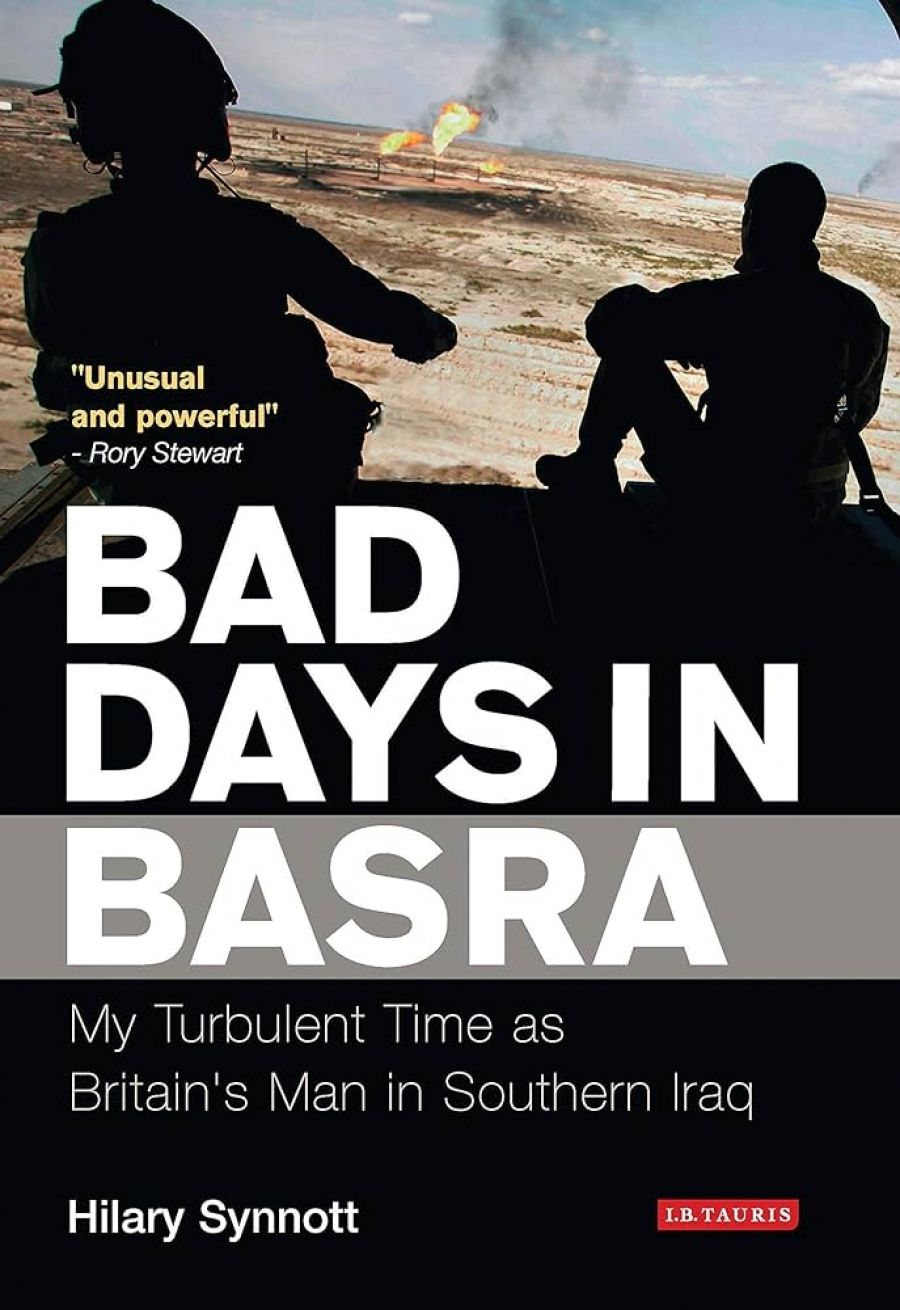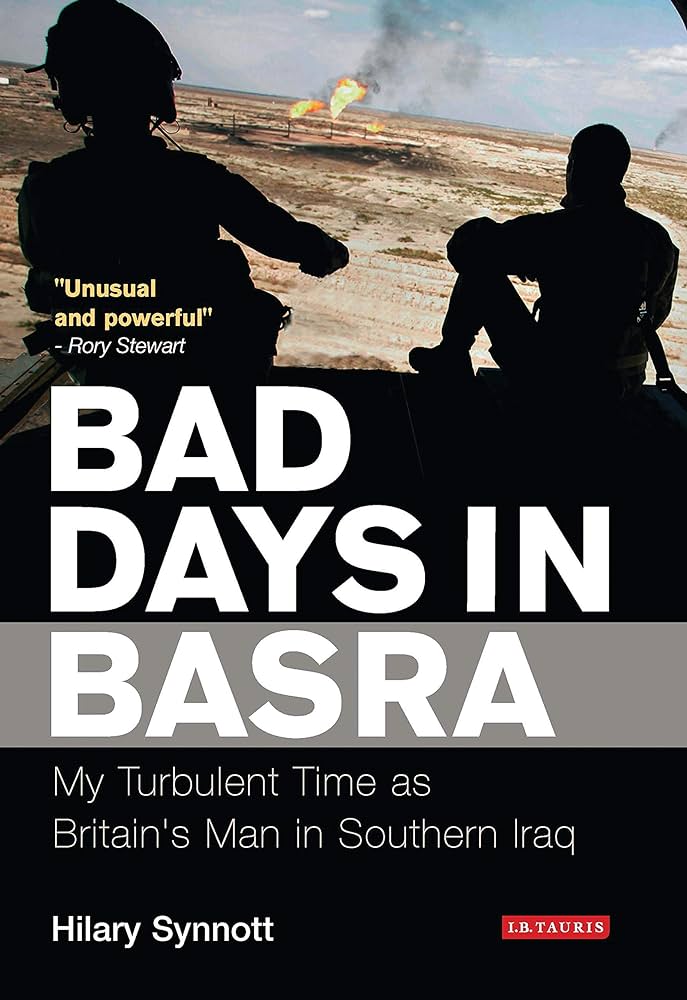
- Free Article: No
- Contents Category: Politics
- Custom Article Title: Just a racket
- Review Article: Yes
- Article Title: Just a racket
- Online Only: No
- Custom Highlight Text:
In the beginning, says a much-repeated joke, was The Plan. Deemed excellent, at first, it passed through many reinterpretations at successive levels of bureaucracy, and ended up being derided as a crock of shit. Britain’s plan for reconstructing Iraq in 2003 might have met the same fate, only there wasn’t one. Don’t laugh: Australia had no plan either, excellent or crock.
- Book 1 Title: Bad Days in Basra
- Book 1 Subtitle: My turbulent times as Britain’s man in southern Iraq
- Book 1 Biblio: I.B. Tauris, £17.99 hb, 287 pp
- Book 1 Cover Small (400 x 600):

- Book 1 Cover (800 x 1200):

Certainly, the human problems of Iraq were obvious before Saddam Hussein fell. Some were due to his misrule, and some were the result of United Nations economic sanctions. But the well-known, neat and plausible American solution of holding elections to replace him and then walking away was wrong, because of the conditions that the invasion itself created. So the human problems got rapidly worse, and with them grew resistance, sectarian violence and lawlessness.
Not even cynical Mencken would have dismissed as wrong the idea that it was more urgent and necessary to restore power, water, communications, and social services to the people of Iraq than to write a sectarian constitution and elect a parliament that would pass oil legislation favourable to the United States. But the former terrorism expert Jerry Bremer did. Nicknamed ‘The Viceroy’, Bremer declared on one occasion that he was ‘the law’, and had the necessary authority for emergency reconstruction. But he dissipated it. He purged Baathist officials and police without compensation, took hasty, unilateral decisions, and often failed to communicate and consult. He had the funds too – much of it trucked around Iraq in bricks of dollar bills – but public utilities were not what he most wanted to spend them on. Then, when it became clear to the world what was going on at Abu Ghraib, Bremer wasn’t ‘the law’ at all.
‘The improvement in the well-being of the disadvantaged population,’ recalls Hilary Synnott, who arrived in Iraq in 2003, ‘did not figure in the CPA’s main declared goal.’ The British, guided by their long – and not always exemplary – experience in the region, thought they understood better than the CPA how to win Iraqi hearts and minds. But Synnott’s multinational civilian team in Basra had little money and few people, depended on the Americans for most of its resources and was under American command. What they did to establish local consultative councils was certainly better than nothing, and for some months, Synnott claims, it worked. Some of his team were Arabic-speakers and some had developing country experience, but in a country that needed intensive care, they were like psychologists: they could dispense little more than talk. Synnot pays tribute to their commitment, but only that offsets his ‘angry narrative of failure’.
Synnott initially believed Tony Blair’s declared reasons for the invasion. With naval experience and diplomatic postings in the region behind him, he was planning to retire in 2003 when Blair recalled him urgently to head the British ‘post-conflict’ civilian team in Iraq’s four southern provinces, offering him every possible support. Blair wanted rapid and visible progress in reconstruction. ‘Visible’ turned out to be the operative word: progress had to be seen in London and Washington to be happening, whether or not it was visible in Baghdad or Basra. Synnott instances Bremer’s visit to the south and his announcement that work would begin to clean out a stagnant canal within four days. The funds to do it never arrived.
Synnott took over from a disillusioned and frustrated Danish diplomat. He arrived in Basra to find the most rudimentary living and working conditions and primitive, insecure communications. He and his colleagues survived on an American breakfast of grits, with hamburgers, hot dogs and Jell-o for other meals, and floury imported apples, even though fresh fruit was available in the markets outside. They envied a team of Japanese engineers who wisely brought their own cooks and ate separately. A couple of enterprising Iraqi women did their laundry, but then, as local resistance to the occupation grew, they were shot. So was one of Synnott’s Gurkha guards, a Japanese diplomat, and nineteen Italians. In Baghdad, the Jordanian Embassy and the UN head-quarters were bombed.
Whitehall was worried, and began issuing superfluous security instructions to Synnott, who fired back testy replies. He had succumbed earlier in his assignment than most diplomats do, though probably with good reason, to the ‘us/them’ syndrome: the conviction that those doing it tough in the field are grievously misunderstood by people in soft jobs at home. He redoubled his efforts, fondly hoping that ministers would notice reports that he gave such riveting titles as ‘Snapshot in a Hot August’, ‘What Needs to be Done’ and ‘Milestones and Challenges’. He even sent a ‘Valedictory Dispatch’, which he read out to his staff in Basra before he left. Since then the Foreign Office, Synnott laments, has abolished paper files and banned valedictories, so his reports have vanished from the record. In one of them, he wrote about American abuse of prisoners, four months before Abu Ghraib became public knowledge.
Rather than letting his reports go to waste, Synnott has clearly recycled some of them as chapters in this book, though regrettably not the Abu Ghraib one. Their new titles, such as ‘Arrival’, ‘Adapting to Ground Reality’, ‘Bugs and Bodyguards’ and ‘Promoting Security and the Rule of Law’ are as riveting as the originals. The content is livelier, though occasionally he sounds like Biggles: ‘“What are the arguments?” I asked crisply.’ As a witty observer of régime change, he is no Chris Patten. In Hong Kong, of course, Patten was the viceroy, which Synnot in Iraq was not. Britain deployed its power and influence in order to leave Hong Kong with dignity. But in Iraq, Bremer was the viceroy and the United States had the only power and influence that counted.
Yet how to leave Iraq with dignity soon became, and remains, a vexed question. Synnott quickly realised that the performance of his small civilian team in rehabilitating the southern provinces represented a ‘ticket out’ for the military. The better the civvies did that, the sooner the grunts could go home. This made for tensions between them.
As usual in accounts of the war in Iraq by others, Australia’s participation barely registers in Synnott’s book. He is complimentary about Aline Matta, an Arabic-speaking Lebanese Australian legal expert in his team. But Synnot doesn’t suffer fools, and the only other Australian he mentions made him angrier than anyone he met. Who should become CPA’s head of the agriculture ministry, after pressure from the Howard government, and be paid $1 million for less than a year’s work, but Trevor Flugge, the former head of the Australian Wheat Board. Synnot recalls the photograph of the Western Australian wheat farmer in Iraq, clad only in shorts, waving a gun. He found Flugge blunt, domineering and dismissive of the Iraqi farmers’ problems, and notes that the Cole Inquiry associated Flugge with kickbacks under the Oil for Food programme. As I write, neither Flugge nor any other Australian has been charged with an offence.
In 1933, Major General Smedley Butler described the American soldier as a ‘gangster for capitalism’ doing the bidding of big business or big oil abroad, and famously declared ‘war is just a racket’. In 2008, American spending on the Iraq racket reached US$648 billion, without commensurate improvement in the lives of surviving Iraqis. Even though Synnott – now Sir Hilary – won’t admit that the occupation of Iraq has failed, nor say that Britain’s withdrawal of troops from Basra was a defeat, his epilogue leaves room for no other conclusion.


Comments powered by CComment